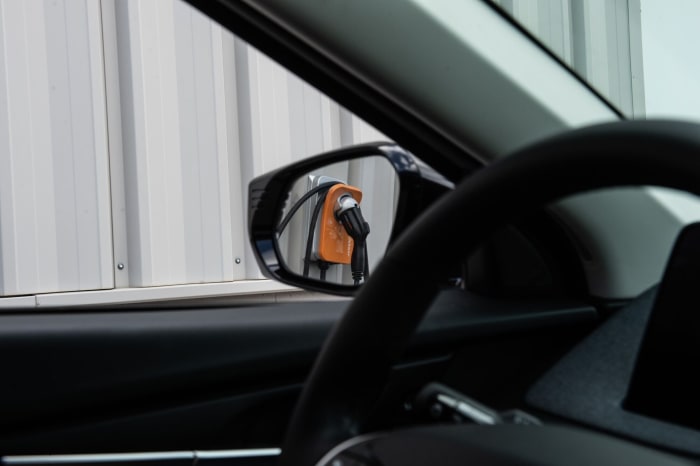Auto Dealers Push Back Against Mandatory EV Sales Targets

Table of Contents
Economic Concerns Driving Dealer Opposition to Mandatory EV Sales Targets
Auto dealers are voicing strong opposition to mandatory EV sales targets, citing substantial economic challenges. The transition to an EV-centric market requires significant upfront investments and carries considerable financial risks.
High upfront costs of EV inventory
The financial burden of stocking EVs is substantial. Dealers face:
- Higher purchase prices: EVs generally have higher sticker prices than their internal combustion engine (ICE) counterparts, requiring a larger initial capital outlay.
- Specialized training needs for mechanics: EV repair and maintenance necessitate specialized training for dealership mechanics, adding to operational costs.
- Installation of charging stations: Dealerships must invest in charging infrastructure to support EV sales, a considerable expense, especially for larger inventories.
- Potential for unsold inventory: The demand for EVs varies greatly geographically. Dealers in regions with lower consumer adoption risk being left with unsold inventory, tying up capital and impacting profitability.
Lack of consumer demand in certain markets
Consumer adoption of EVs is not uniform across all markets. Several factors contribute to this uneven demand:
- Consumer affordability concerns: The higher upfront cost of EVs remains a significant barrier for many consumers.
- Range anxiety: Concerns about limited driving range and the availability of charging stations continue to deter potential buyers, particularly in rural areas.
- Limited charging infrastructure: The lack of widespread and reliable charging infrastructure, especially outside urban centers, hinders EV adoption.
- Lack of awareness about EV benefits: Many consumers remain unaware of the total cost of ownership advantages and environmental benefits of EVs.
Impact on profitability and potential business closures
The pressure to meet mandatory EV sales targets could severely impact the profitability of dealerships, potentially forcing smaller businesses to close. This is due to:
- Reduced profit margins on EVs: Dealers often report lower profit margins on EV sales compared to ICE vehicles, squeezing their bottom line.
- Increased operational costs: The costs associated with EV inventory, training, and charging infrastructure add to already existing operational expenses.
- Financial burden of meeting sales quotas: The pressure to meet government-mandated targets creates a significant financial burden, especially for dealerships with limited resources.
Arguments for Mandatory EV Sales Targets and the Counter-Arguments from Dealers
While dealers highlight economic challenges, the arguments supporting mandatory EV sales targets are rooted in environmental necessity and government policy.
Environmental benefits and government regulations
Governments worldwide are implementing regulations to curb carbon emissions and mitigate climate change. Mandatory EV sales targets are a key policy tool in this effort. However, dealers counter with:
- Claims of unrealistic timelines: Dealers argue that the timelines for achieving these targets are often unrealistic, given the current pace of EV adoption and infrastructure development.
- The need for consumer education and incentives: Dealers emphasize the importance of robust consumer education and financial incentives to stimulate demand and facilitate a smooth transition.
- Concerns about market distortion: Some dealers worry that mandatory EV sales targets could lead to market distortions, favoring specific manufacturers or technologies.
Transition to a sustainable automotive industry
The shift towards electric vehicles is inevitable for a sustainable automotive industry. Dealers have a crucial role to play in this transition:
- Long-term benefits of EV adoption: While acknowledging short-term challenges, dealers must recognize the long-term benefits of EV adoption for the environment and the automotive industry.
- The role of dealers in educating consumers: Dealerships can play a critical role in educating consumers about the advantages of EVs and dispelling common misconceptions.
- Suggestions for government support to aid the transition: Dealers advocate for government support, including financial incentives and infrastructure development, to ease the transition.
- Criticisms of government overreach: Dealers express concerns about potential government overreach and the need for balanced policies that consider the economic realities of the industry.
Concerns about consumer choice and market disruption
Dealers also express concerns about the potential impact on consumer choice and market stability:
- Reduced variety of vehicle types: A rapid shift towards EVs might limit the variety of vehicle types available to consumers.
- Potential devaluation of ICE vehicles: The increased popularity of EVs could lead to a devaluation of ICE vehicles in the used car market.
- Market instability and uncertainty for consumers: The rapid change could create market instability and uncertainty for both consumers and dealers.
Potential Solutions and Compromises Regarding Mandatory EV Sales Targets
Finding a balance between environmental goals and the economic viability of dealerships is crucial. Potential solutions include:
Phased implementation and flexible targets
A gradual increase in mandatory EV sales targets, rather than a sudden shift, could allow dealers to adapt more effectively:
- Regional variations in targets based on market demand: Targets should be adjusted based on regional variations in EV demand and infrastructure development.
- Government incentives for EV adoption: Governments should provide generous incentives to consumers to encourage EV adoption.
- Support for dealer training and infrastructure development: Government support for dealer training programs and charging infrastructure development is essential.
Increased consumer incentives and education
Boosting consumer demand is vital for a successful transition to EVs:
- Tax credits, rebates, and government subsidies: Financial incentives are crucial to making EVs more affordable and attractive to consumers.
- Public awareness campaigns focusing on the benefits of EVs: Comprehensive public awareness campaigns are needed to educate consumers about the benefits of EVs.
Collaboration between government and auto dealers
Open communication and collaboration between governments and auto dealers are essential for a smooth transition:
- Joint strategies for successful EV adoption: Joint strategies developed in collaboration between government and industry stakeholders will ensure a more effective transition.
- Addressing dealer concerns: Addressing the legitimate economic concerns of dealers is crucial for their participation in the transition.
- Ensuring a fair and sustainable transition: Collaboration will help to ensure a fair and sustainable transition to an EV-centric market.
Conclusion: Navigating the Future of Auto Sales with Mandatory EV Sales Targets
The debate surrounding mandatory EV sales targets highlights the inherent tension between environmental imperatives and economic realities. Dealers face significant challenges in adapting to this rapid shift, while governments are determined to accelerate the transition to a greener future. A path forward requires collaboration, phased implementation, and increased consumer incentives. By addressing the economic concerns of dealers while continuing to promote the environmental benefits of EVs, a more sustainable and equitable transition can be achieved. We encourage you to learn more about the debate surrounding mandatory EV sales targets, researching government initiatives and considering the long-term implications of the shift toward electric mobility. Understanding the nuances of this discussion is crucial for shaping the future of the automotive industry.

Featured Posts
-
 Last Hurrah Former Ufc Champ Returns After Year Long Hiatus
May 04, 2025
Last Hurrah Former Ufc Champ Returns After Year Long Hiatus
May 04, 2025 -
 Lizzo Sza And Another Artist Their Almost Rock Band
May 04, 2025
Lizzo Sza And Another Artist Their Almost Rock Band
May 04, 2025 -
 Review The Count Of Monte Cristo A Swashbuckling Tale Of Revenge
May 04, 2025
Review The Count Of Monte Cristo A Swashbuckling Tale Of Revenge
May 04, 2025 -
 Ufc Des Moines Predictions Mma Betting Picks And Odds For Today
May 04, 2025
Ufc Des Moines Predictions Mma Betting Picks And Odds For Today
May 04, 2025 -
 Cronica De La Victoria De Fabio Christen En La Vuelta A Murcia
May 04, 2025
Cronica De La Victoria De Fabio Christen En La Vuelta A Murcia
May 04, 2025
